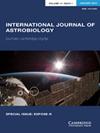宇宙智慧的未来:谦逊的呼唤
IF 1
4区 物理与天体物理
Q3 ASTRONOMY & ASTROPHYSICS
引用次数: 0
摘要
最近的天体物理学发现表明,宇宙宜居的时代才刚刚开始。这就提出了一个问题,即整个宇宙是否在未来的某个时刻充满了智慧生命。汉森等人(2021,《天体物理杂志》922182)认为,我们可以相信,按照宇宙标准,宇宙很快就会被帝国主义文明所主宰,这些文明迅速扩张,长期存在,并对其控制的体积做出巨大改变。这种“贪婪文明”假说的主要动机是,它被认为为我们为什么处于宇宙历史的早期提供了一个很好的解释。在本文中,我们批评了这种动机,并认为它失败了,原因类似于臭名昭著的末日论失败的原因。在论文的最后一部分,我们扩大了我们的讨论范围,并认为将相当低的先验概率分配给grabby文明假说可能是合理的。例如,如果有任何文明快速而无限期地扩张,它们很可能不会对其居住的数量做出任何剧烈的改变,这可能是出于战略原因。因此,我们呼吁对宇宙中智力的长期进化问题保持认识上的谨慎和谦逊。本文章由计算机程序翻译,如有差异,请以英文原文为准。
The future of intelligence in the Universe: a call for humility
Recent astrophysical findings suggest that the era during which the Universe is habitable has just begun. This raises the question whether the entire Universe may at some point in the future be filled with intelligent life. Hanson et al. (2021, The Astrophysical Journal922, 182) argued that we can be confident that the Universe will, by cosmic standards, soon be dominated by imperialist civilizations which expand rapidly, persist long and make drastic changes to the volumes they control. The main motivation for this ‘grabby civilizations’ hypothesis is that it supposedly provides a good explanation of why we are so early in cosmic history. In this paper, we criticize this motivation and suggest that it fails, for reasons analogous to why the notorious Doomsday argument fails. In the last part of the paper we broaden our discussion and argue that it may be rational to assign a rather low prior probability to the grabby civilizations hypothesis. For instance, if there are any civilizations that expand rapidly and indefinitely, they may well not make any drastic changes to the volumes they inhabit, potentially for strategic reasons. Hence, we call for epistemic caution and humility regarding the question of the long-term evolution of intelligence in the Universe.
求助全文
通过发布文献求助,成功后即可免费获取论文全文。
去求助
来源期刊

International Journal of Astrobiology
地学天文-地球科学综合
CiteScore
3.70
自引率
11.80%
发文量
45
审稿时长
>12 weeks
期刊介绍:
International Journal of Astrobiology is the peer-reviewed forum for practitioners in this exciting interdisciplinary field. Coverage includes cosmic prebiotic chemistry, planetary evolution, the search for planetary systems and habitable zones, extremophile biology and experimental simulation of extraterrestrial environments, Mars as an abode of life, life detection in our solar system and beyond, the search for extraterrestrial intelligence, the history of the science of astrobiology, as well as societal and educational aspects of astrobiology. Occasionally an issue of the journal is devoted to the keynote plenary research papers from an international meeting. A notable feature of the journal is the global distribution of its authors.
 求助内容:
求助内容: 应助结果提醒方式:
应助结果提醒方式:


